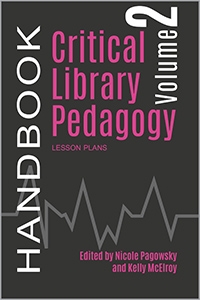Primary tabs
You don't need to be an ALA Member to purchase from the ALA Store, but you'll be asked to create an online account/profile during checkout to proceed. This Web Account is for both Members and non-Members. Note that your ALA Member discount will be applied at the final step of the checkout process.
If you are Tax-Exempt, please verify that your account is currently set up as exempt before placing your order, as our new fulfillment center will need current documentation. Learn how to verify here.
- Description
- Table of Contents
- About the authors
Critical pedagogy incorporates inclusive and reflective teaching for aims of social justice; it provides mechanisms for students to evaluate their social, political, and economic standing, and to question societal norms and how these norms perpetuate societal injustices. Teaching librarians have long incorporated social justice into their work, but focused interest in critical library pedagogy has grown rapidly in recent years.
In two volumes, the Critical Library Pedagogy Handbook works to make critical pedagogy more accessible for library educators, examining both theory and practice to help the busy practitioner explore various aspects of teaching for social justice.
Volume Two, Lesson Plans, provides plans covering everything from small activities to multi-session projects. Critical pedagogy requires collaborating with learners and adapting to their needs, as well as continual reflection, but these lessons provide elements you can pull and tweak to fit your own environment. These chapters also provide 30 different views on creating and delivering critically designed information literacy instruction and reflect material commonly requested by faculty—including introductions to databases, evaluating information sources, and the research cycle.
These two volumes provide a collection of ideas, best practices, and plans that contribute to the richness of what it means to do this type of work in libraries. The Critical Library Pedagogy Handbook will help you build personal teaching skills and identity, cultivate local community, and document your journey as a critical practitioner.
Foreword
Safiya Umoja Noble
Acknowledgments
Introduction
Nicole Pagowsky and Kelly McElroy
Chapter 1. Mapping Power and Privilege in Scholarly Conversations
Lauren Wallis
Chapter 2. Moving Students to the Center through Collaborative Documents in the Classroom
Maura A. Smale and Stephen Francoeur
Chapter 3. Deconstructing Gender in Financial Literacy
Fobazi M. Ettarh
Chapter 4. Question Authority and Be an Authority: The Future Belongs to Us
Romel Espinel
Chapter 5. Podcasting as Pedagogy
Nora Almeida
Chapter 6. Speaking Up: Using Feminist Pedagogy to Raise Critical Questions in the Information Literacy Classroom
Sharon Ladenson
Chapter 7. Authority and Source Evaluation in the Critical Library Classroom
Eamon Tewell and Katelyn Angell
Chapter 8. Critical Pedagogy and the Information Cycle: A Practical Application
Gina Schlesselman-Tarango and Frances Suderman
Chapter 9. Critical Engagement with Numbers and Images
Christine Photinos
Chapter 10. Critical Consciousness and Search: An Introductory Visualization
Sarah Polkinghorne
Chapter 11. Googling Google: Search Engines as Market Actors in Library Instruction
Jacob Berg
Chapter 12. Zines as Primary Sources
Kelly Wooten
Chapter 13. Teaching with Riot Grrrl: An Active Learning Session at the Intersections of Authenticity and Social Justice
Amy Gilgan
Chapter 14. Using Pop Culture, Feminist Pedagogy, and Current Events to Help Students Explore Multiple Sides of an Argument
Dory Cochran
Chapter 15. Zines in the Classroom: Critical Librarianship and Participatory Collections
Robin Potter and Alycia Sellie
Chapter 16. Where Should These Books Go?
Haruko Yamauchi
Chapter 17. Questioning Health Sciences Authority
Xan Goodman
Chapter 18. Critical Pedagogy for Business and Management Undergraduates: Evaluation of Marketing Information
Ilana Stonebraker, Caitlan Maxwell, and Jessica Jerrit
Chapter 19. Teaching with Data: Visualization and Information as a Critical Process
Andrew Battista and Jill Conte
Chapter 20. From Traditional to Critical: Highlighting Issues of Injustice and Discrimination through Primary Sources
Alan Carbery and Sean Leahy
Chapter 21. My Primary Sources: Using Student Personal History as a Gateway to Historical Context
Margaret Browndorf
Chapter 22. Historical Newspapers and Critical Thinking: A Lesson Plan
Gina Levitan
Chapter 23. Thinking through Visualizations: Critical Data Literacy Using Remittances
Erin Pappas, Celia Emmelhainz, and Maura Seale
Chapter 24. Critically Reflective Final Exercise
Angela Pashia
Chapter 25. Fresh Techniques: Hip Hop and Library Research
Dave Ellenwood and Alyssa Berger
Chapter 26. Social Justify Your Lesson Plan: How to Use Social Media to Make Pop Culture Scholarly
Lydia Willoughby and Kelly Blanchat
Chapter 27. Zotero: A Tool for Constructionist Learning in Critical Information Literacy
Joshua F. Beatty
Chapter 28. Ten-Minute Brainstorm in a First-Year English One-Off
Jenna Freedman
Chapter 29. How to Get to the Library from Here, There, and Everywhere!
Jolanda-Pieta (Joey) van Arnhem
Chapter 30. Incorporating Critically Conscious Assessment into a Large-Scale Information Literacy Program
Rachel Gammons
About the Authors
Nicole Pagowsky
Nicole Pagowsky is an Associate Librarian and Instruction Coordinator at the University of Arizona Libraries. She earned graduate degrees in LIS and Instructional Design from the University of Arizona. She teaches the ALA eCourse Instructional Design Essentials, and LIS 581 Information Literacy Pedagogy. Her research interests include critical approaches to pedagogy and instructional design, student motivation, and programmatic information literacy.
Kelly McElroy
Kelly McElroy has worked in public and academic libraries since she was in high school. She is currently an outreach librarian and Associate Professor at Oregon State University, where she also helped organize the faculty union, United Academics OSU. As a unionist, she has served on the bargaining team for multiple rounds of bargaining, including as lead negotiator, and as the Executive Vice President.



